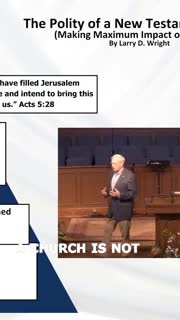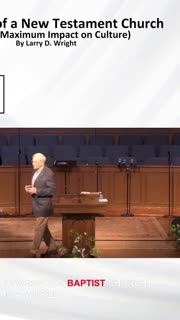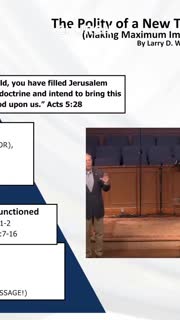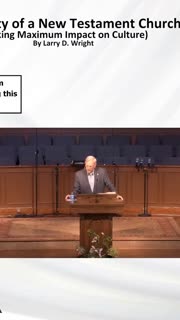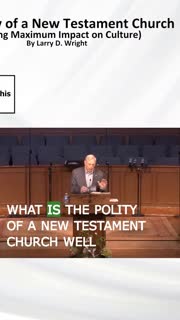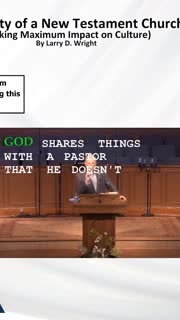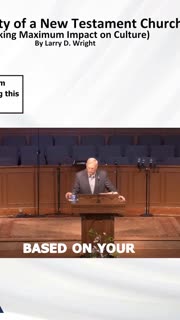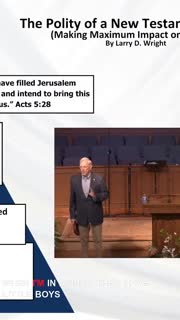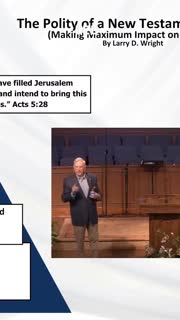Mobilizing the Church: Unity and Purpose in Transition
Devotional
Sermon Summary
Bible Study Guide
Sermon Clips
### Quotes for Outreach
1. "A church is not a group of people that comes and just sits and sours week after week after week. We come for worship, for Bible study, for training, for all sorts of things. We do that to have a church to help mobilize us. See, that is what we as pastors have a hard time getting people to understand from time to time. You're not just here to sit and hear; you are here to be mobilized to make an impact." [31:55] (30 seconds)
2. "Underwood Baptist Church is a world vision church. I know it's a part of the United States, but we just had a team come back from Alaska. We have teams going to Honduras. I represent us in Africa. We have a world vision that's good, but our goal is to impact our culture starting here and rippling all out the rest of the world." [32:34] (25 seconds)
3. "The problem that the church worldwide is having is we're not impacting our culture; our culture's impacting us. The world is not more like Jesus; Jesus people are more like the world. But that's another day and another time." [35:37] (17 seconds)
4. "Unity is an army marching in cadence. Unity is you ever been to a big event they have a huge 50, 75, 100 piece orchestra you got there early get a good seat and those that orchestra is warming up and this group is doing this everybody's doing their own thing they're tuning up their instruments they're doing this drum cymbal sound like a cat sucked up in a vacuum cleaner it just doesn't sound but when Maestro stands up there he comes down and that orchestra all comes together on the same page playing the same note at the same time but with a different sound from each instrument that's unity." [01:12:06] (48 seconds)
### Quotes for Members
1. "What is the polity of a New Testament church? Well, first of all, I need to define polity because perhaps for many of you that would be a new word. What does the word polity mean? Politics or equality is the way an organization governs itself. You have people who are like minded in us. We are not only like minded as a church, we are kin to each other in the blood of Jesus Christ." [31:09] (31 seconds)
2. "God shares things with a pastor that he doesn't share with anybody else. God shares vision with a pastor and nobody else because it's to be pastor led. Now when that pastor gets that vision and again I'm not talking some you know some hippie experience you know been eating mushrooms or whatever I'm talking about God gives you a vision it don't mean you're asleep it means you just you know." [55:40] (31 seconds)
3. "A church is to be pastor led, deacon served, committee functioned, and congregationally approved. When you read in the book of Acts, you'll find words like this: they scatter preaching, the hand of God was on the phone, we're talking about the congregation, they believed, they turned to the Lord, they encouraged everyone with purpose of heart, they continued with the Lord, great many souls added, assembled, taught, first called Christians at Antioch." [01:09:22] (60 seconds)
4. "When I'm in Africa they have little boys 12, 13, 14 years old their job they got these big old cows they sort of look like Brahmins but they're different they got these big old horns that come out and they kind of look like a long horn from Texas but a little different than that those boys got a little stick in the back and they'll take 8, 10, 12, 20 cows they'll drive them down the road they graze all up down the side of the road they don't have any program that cuts the grass and that probably came from a poor family they don't have a lot of land to pasture their cows so they graze all up down the side of the road and those little boys take that stick they drive big old huge cows I mean huge and he drives them down the road moves them from one location to another well a shepherd is not one from behind who drives with a rod he's one out front who leads." [01:13:24] (53 seconds)
5. "Pastor led, deacon served, committee functioned, congregation approved in unity and harmony and it impacts the culture. Father, I pray in Jesus name you would help us to be a New Testament church by being a New Testament citizen right now who we are that can honor you with our lives we evangelize and we strengthen the brethren and that we approve your will for our lives." [01:14:37] (34 seconds)
Ask a question about this sermon
1. "A church is not a group of people that comes and just sits and sours week after week after week. We come for worship, for Bible study, for training, for all sorts of things. We do that to have a church to help mobilize us. See, that is what we as pastors have a hard time getting people to understand from time to time. You're not just here to sit and hear; you are here to be mobilized to make an impact." [31:55] (30 seconds)
2. "Underwood Baptist Church is a world vision church. I know it's a part of the United States, but we just had a team come back from Alaska. We have teams going to Honduras. I represent us in Africa. We have a world vision that's good, but our goal is to impact our culture starting here and rippling all out the rest of the world." [32:34] (25 seconds)
3. "The problem that the church worldwide is having is we're not impacting our culture; our culture's impacting us. The world is not more like Jesus; Jesus people are more like the world. But that's another day and another time." [35:37] (17 seconds)
4. "Unity is an army marching in cadence. Unity is you ever been to a big event they have a huge 50, 75, 100 piece orchestra you got there early get a good seat and those that orchestra is warming up and this group is doing this everybody's doing their own thing they're tuning up their instruments they're doing this drum cymbal sound like a cat sucked up in a vacuum cleaner it just doesn't sound but when Maestro stands up there he comes down and that orchestra all comes together on the same page playing the same note at the same time but with a different sound from each instrument that's unity." [01:12:06] (48 seconds)
### Quotes for Members
1. "What is the polity of a New Testament church? Well, first of all, I need to define polity because perhaps for many of you that would be a new word. What does the word polity mean? Politics or equality is the way an organization governs itself. You have people who are like minded in us. We are not only like minded as a church, we are kin to each other in the blood of Jesus Christ." [31:09] (31 seconds)
2. "God shares things with a pastor that he doesn't share with anybody else. God shares vision with a pastor and nobody else because it's to be pastor led. Now when that pastor gets that vision and again I'm not talking some you know some hippie experience you know been eating mushrooms or whatever I'm talking about God gives you a vision it don't mean you're asleep it means you just you know." [55:40] (31 seconds)
3. "A church is to be pastor led, deacon served, committee functioned, and congregationally approved. When you read in the book of Acts, you'll find words like this: they scatter preaching, the hand of God was on the phone, we're talking about the congregation, they believed, they turned to the Lord, they encouraged everyone with purpose of heart, they continued with the Lord, great many souls added, assembled, taught, first called Christians at Antioch." [01:09:22] (60 seconds)
4. "When I'm in Africa they have little boys 12, 13, 14 years old their job they got these big old cows they sort of look like Brahmins but they're different they got these big old horns that come out and they kind of look like a long horn from Texas but a little different than that those boys got a little stick in the back and they'll take 8, 10, 12, 20 cows they'll drive them down the road they graze all up down the side of the road they don't have any program that cuts the grass and that probably came from a poor family they don't have a lot of land to pasture their cows so they graze all up down the side of the road and those little boys take that stick they drive big old huge cows I mean huge and he drives them down the road moves them from one location to another well a shepherd is not one from behind who drives with a rod he's one out front who leads." [01:13:24] (53 seconds)
5. "Pastor led, deacon served, committee functioned, congregation approved in unity and harmony and it impacts the culture. Father, I pray in Jesus name you would help us to be a New Testament church by being a New Testament citizen right now who we are that can honor you with our lives we evangelize and we strengthen the brethren and that we approve your will for our lives." [01:14:37] (34 seconds)
